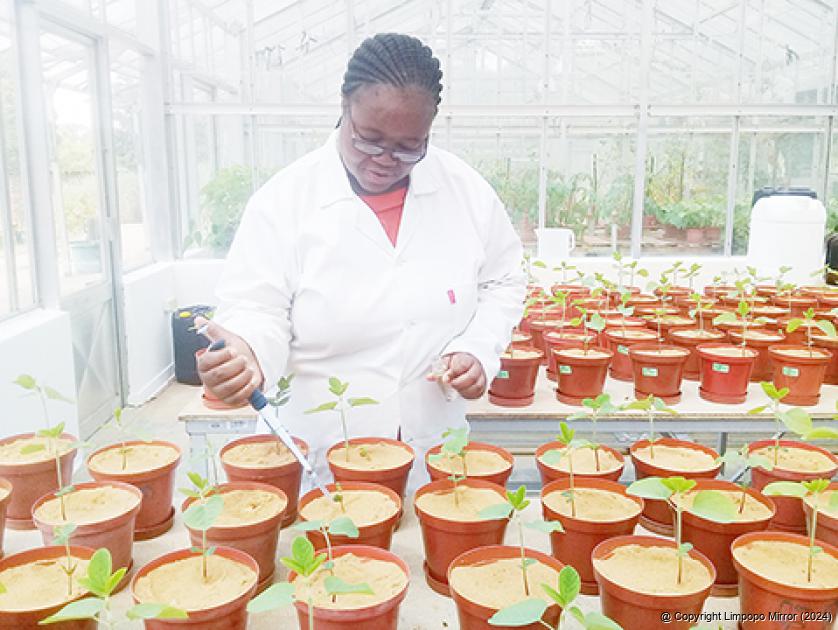

ADVERTISEMENT:

Ms Francina Bopape inside her greenhouse at the Agricultural Research Council – Roodeplaat (Pretoria). The pigeonpea seedlings in the background were used for trapping the soil bacterial strain. Picture supplied.
Doctoral student from Univen discovers unusual bio-inoculant
A final-year doctoral candidate at the School of Agriculture at the University of Venda (Univen), Ms Francina Bopape, recently discovered a novel type of soil bacterium that has huge potential for producing organic nitrogen fertilizer.
A resident at Ga-Mogoboya village in the Tzaneen area, Bopape is currently based at Agricultural Research Council Plant Health and Protection in Pretoria.
Part of the research project is aimed at helping small-scale farmers who produce bean crops. Some field crops, particularly the bean types, such as soybeans and others, are unique in the sense that they take up nitrogen gas (from the air) and convert it into nitrogen fertilizer.
“In general, all field crops require this fertilizer for growth and, ultimately, the production of grain yield,” said Bopape. “It is for this reason that farmers apply commercial chemical nitrogen fertilizer (which is quite expensive) to crops.”
However, the bean types of plants can circumvent the need for this expensive fertilizer if they are grown in a soil that harbours indigenous bacteria called soil rhizobia, which then form small round structures on the roots called nodules that enable the manufacturing of the organic nitrogen fertilizer by the plant.
“During planting, commercial farmers often mix (or inoculate) the bean seed with commercially available soil bacteria in order to enhance the subsequent manufacturing of the nitrogen fertilizer by the plants as they grow from seedlings to adult plants,” she said. “This means that farmers save on the cost of input for producing the crop.”
According to Bopape, organic bio-inoculants are not hazardous to the environment and do not cause any side or negative effects to humans, animals and the environment. “Indigenous South African soils are rich in rhizobia that can convert nitrogen into beneficial bio-fertilizer or bio-inoculants,” Bopape said.
Using local soil samples, Bopape trapped the indigenous soil bacteria in the seedlings of a bean type of plant, called the pigeonpea. She then harvested the nodules and squeezed out the bacteria in the laboratory before purifying them for the next stage, which identifies the genes that are responsible for the nitrogen fertilizer-manufacturing process, among other genes.
“Contrary to the current available information, the novel strain of bacterium involved did not possess the common key genes found in other rhizobia that are necessary in the process of nitrogen fertilizer manufacturing, suggesting that there is an alternative method,” she said.
The main supervisor, Prof Eastonce Gwata in the Department of Crop Science, commented that the results from Bopape’s work had several positive implications, particularly for bio-inoculant technology. The next step in the study is to understand the mechanism at work in the strain before attempting its genetic enhancement for the benefit of farmers.
Date:16 March 2020
By: Tshifhiwa Mukwevho
Tshifhiwa Given Mukwevho was born in 1984 in Madombidzha village, not far from Louis Trichardt in the Limpopo Province. After submitting articles for roughly a year for Limpopo Mirror's youth supplement, Makoya, he started writing for the main newspaper. He is a prolific writer who published his first book, titled A Traumatic Revenge in 2011. It focusses on life on the street and how to survive amidst poverty. His second book titled The Violent Gestures of Life was published in 2014.
Read: 1790

ADVERTISEMENT

ADVERTISEMENT:

ADVERTISEMENT:

Recent Articles
-

Vocalist raises voice GBV problem
19 April 2024 By Elmon Tshikhudo -

‘Mukoma vho tshinyadza ndaka yanga’
19 April 2024 By Kaizer Nengovhela -

Department shuts down Ziggy School
19 April 2024 By Thembi Siaga -

Vhamusanda Vho Mulingoni Eric “Rambo” Tshivhase vho dzama
19 April 2024 By Victor Mukwevho -

Tshikolo tsha Russell Bungeni tsho netshedzwa tshifhaṱo tsha saintsi
19 April 2024 By Khathutshelo Raliphaswa

ADVERTISEMENT

Popular Articles
-

Leopards’ top striker dreams of playing for Kaizer Chiefs
22 March 2024 By Frank Mavhungu -

Well-known inventor, Prof Mulalo Doyoyo, dies
14 March 2024 By Victor Mukwevho -

Lesley Manyathela stadium remains a 'white elephant' to local clubs
23 March 2024 By Kaizer Nengovhela -

Murder suspect appears in Mutale Court
22 February 2024 By Victor Mukwevho -

Masindi case likely to introduce new era of customary law
24 February 2024 By Anton van Zyl -

Park development leaves residents puzzled
22 March 2024 By Andries van Zyl -

Many questions as man shoot himself in the head
15 March 2024 By Elmon Tshikhudo


